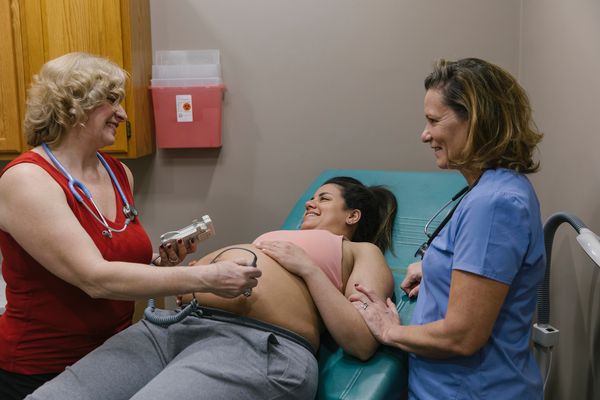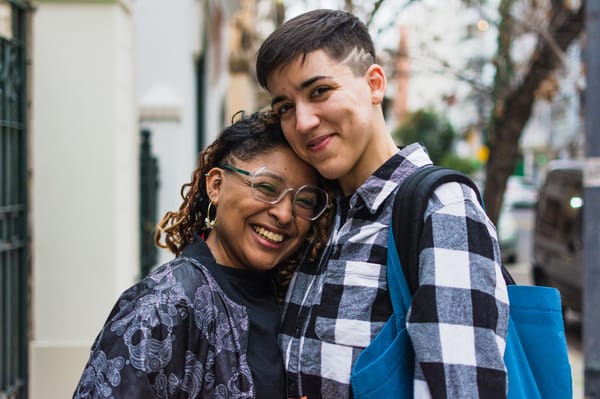The U.S. is facing a maternal health crisis disproportionately affecting mothers of color. Black women are two to three times more likely to die from pregnancy-related complications than white women. These are bleak numbers — especially considering the U.S. has one of the highest base maternal mortality rates of any resource-rich country, and recent statistics suggest this trend will continue indefinitely. The ratio of deaths per live births increased by more than 50% between 2019 and 2021, according to the CDC.
The disparity in outcomes between pregnant BIPOC and white individuals underlines the dire need for change in our current approach to maternal care. As July marks National Minority Mental Health Awareness Month, it’s an apt time to acknowledge and address the specific struggles minority communities face regarding mental, physical and maternal care. This year, Stork Club is focusing on the critical role doula care plays in improving the physical and mental health of underserved populations, specifically within the context of pregnancy and childbirth.
Doulas are trained professionals who provide physical, emotional and educational support to expectant parents before, during and after childbirth. Doulas have shown significant potential in bridging seismic health gaps, especially when their care is community-specific and sensitive. By offering personalized, one-on-one care, doulas help pregnant individuals navigate the healthcare system and empower them to make informed decisions about their care.
Without doulas, BIPOC families face deep health inequities
Systemic and institutional racism, including bias within the healthcare field, significantly impacts health outcomes for BIPOC individuals. As such, navigating the healthcare system can be fraught for BIPOC families.
A lack of representation in healthcare providers, communication barriers, culturally insensitive care and implicit biases within the medical community all contribute to maternal health inequities. When any of these factors come into play — or compound with other factors, such as the social determinants of health (SDOH) — patients may receive delayed or inadequate care and misdiagnoses, stoking a long-term lack of trust in the healthcare system. In other words: Inadequate health outcomes for BIPOC families contribute to a vicious cycle.
This cycle can have dire consequences on maternal health. Pregnant BIPOC individuals often report feeling unheard or dismissed when expressing concerns about their health or the health of their unborn child. Medical disregard during critical stages of pregnancy can lead to severe complications and even death. Furthermore, BIPOC individuals are more likely to experience poor birth outcomes, including pre-term births, low birth weight and infant mortality.
Recognizing and combating these systemic barriers and biases is critical to improve maternal health outcomes for BIPOC communities. One promising way to reduce inequities is to integrate doula care into the standard maternity care toolkit. Doulas — who focus on personalized, continuous support — advocate for marginalized parents-to-be, helping them navigate a complex healthcare system, ensuring their concerns are heard and addressed, and providing culturally sensitive and respectful care.
How doula care alleviates gaps in treatment
Doulas provide medically necessary support and expertise during critical stages of pregnancy, improving physical and mental health implications for expecting parents.
According to the Journal of Perinatal Education, women who receive doula support during childbirth experience fewer medical interventions — including C-sections — and are more likely to have self-reported positive childbirth experiences. The impact of these outcomes goes beyond the physical; they also impact expecting parents’ mental and emotional well-being.
The mental health benefits of culturally sensitive doula support cannot be underestimated. Pregnancy and postpartum are challenging periods for birthing individuals. One in nine women experiences postpartum depression (PPD) — and for BIPOC individuals, who often face additional stressors and barriers to mental health care, the statistics are even more dire. Some studies suggest Black and Latinx mothers experience PPD at nearly twice the rate of their white counterparts.
The employer’s role in doula care provisions
As the top provider of insurance in the U.S., private employers are responsible for offering their employees leading care options. Ideally, employers should realize this responsibility by providing employees with family-building benefits that help improve birth outcomes through offerings like doula care, fertility treatments and mental health resources.
The Stork Club Birth Doula Program is an excellent example of how professional doula services can be integrated into healthcare plans. This program allows birthing individuals from underserved communities to access valuable doula services, promoting physical and mental well-being. In a clinical trial, mothers on the Stork Club plan had much better health outcomes than the national average, with a 45% reduction in C-sections and 58% fewer preterm births. We achieve these results, in part, by prioritizing culturally sensitive care for diverse employees.
At Stork Club, access to critical reproductive healthcare is a basic human right. Join us on the mission to make reproductive care available for all. Are you interested in adding Stork Club to your team? Sign up to view a demo.




